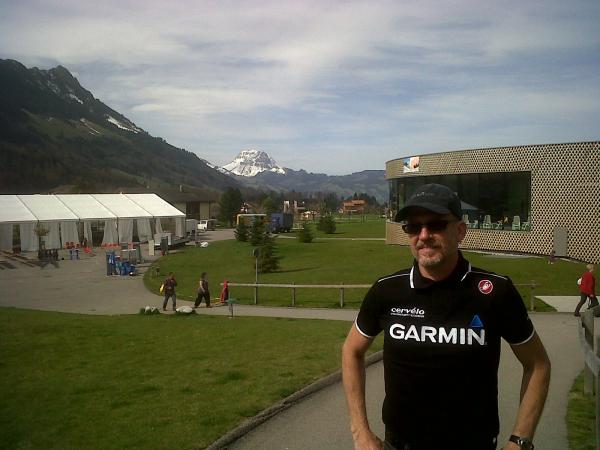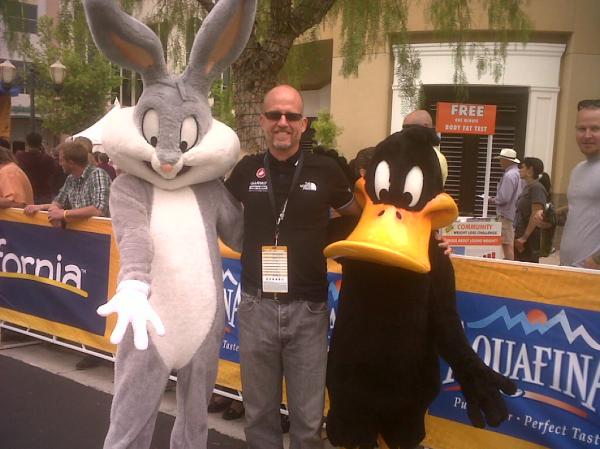Steffen: Anti-doping vigilance needs to continue in wake of USADA investigation
Implicated doctors should lose their medical license


The Festina scandal of 1998 was supposed to herald a new dawn in professional cycling and a glorious opportunity for the sport to redefine its boundaries through a process of cleansing and reconciliation. It was meant to shepherd in a new dawn of clean cycling. How wrong we all were.
UCI no needle policy a possibility ahead of Giro d'Italia, says Steffen
Video: Steffen on Garmin-Cervélo's no-needle policy
Basso won’t back up Hamilton’s Fuentes claims
Danielson, Vande Velde and Zabriskie accept USADA bans
McQuaid tight-lipped on UCI response to USADA reasoned decision
Instead, the vacuum created by Festina was rigorously set upon by a pandemic spread of liars as one clan of dopers replaced another. New dawn gave way to false hope, before the situation deteriorated to such an extent that it looked as though Festina never even happened. Dopers were racing within months, teams closed ranks and the UCI failed to address the situation appropriately. The doping arms race kicked on, and on, and on.
Whether Armstrong's USADA case represents Festina 2.0 is open for debate but according to Prentice Steffen Garmin-Sharp's chief doctor, what's undeniable is that cycling stands at a cross-roads.
A fight for anti-doping
If you're not aware of Steffen's place in cycling, a brief history is in order.
Steffen was the doctor who refused to facilitate doping at US Postal. He served on the team from 1993 until 1996 but when he abstained from providing riders with the ‘preparation' they required his contract was annulled and Dr Celaya took over. Steffen was also the doctor Marty Jemison punched in the face for talking to David Walsh in 2001 and in 2006 he was forced for sign a grovelling public apology after telling L'Equipe that Lance Armstrong was a doper. Publicly it also cost him his job, but the apology was written by Armstrong's people and in signing it Steffen was attempting to protect his team.
And to bring you right up to speed, he's also the doctor that pushed far more than any other physician for the no-needle policy that was made a formal UCI regulation and put in place by the IOC for the London Olympic Games. Read through the affidavits from Jonathan Vaughters and Christian Vande Velde and the importance of this policy should not be underestimated.
The latest race content, interviews, features, reviews and expert buying guides, direct to your inbox!
"We need to continue to be vigilant," Steffen tells Cyclingnews in light of USADA's recent banning of Armstrong and investigation into doping at the US Postal team.
"Vigilance means we should not do what we did after Festina and think that we've done a big thing and that the problem has been exposed. That being exposed is 90 per cent solving the problem and that we can go happily on our way. That would be foolish. History shows exactly what happens because one person and another group of people took advantage of that lapse in our attention after Festina.
"We know the names Ferrari and Cecchini and we know the names Del Moral, Fuentes and Celaya but I suspect that there are a handful of other doctors that we don't know who could easily be doing this thing. Vigilance at this time, and I might call it the Festina effect, is critical."
Steffen's secondary concern surrounds Armstrong himself. While USADA has banned the ex-rider and stripped him of his Tour titles, the sport still waits on whether the UCI will ratify the ban or appeal the case to CAS. David Walsh, who brought Steffen into the limelight in 2001 with his book LA Confidential doesn't believe, that Armstrong will confess to his past.
But Steffen disagrees and plots a potential route that Armstrong may follow.
"This isn't the first time we've thought that he was down and out. In 2006, that was the perfect example with the story of the positive samples of 1999. I opened my mouth, and it led to the focus and laser treatment being focused on Jonathan Vaughters, Doug Ellis and our budding little Slipstream team where we were trying to develop riders in a clean environment," Steffen says.
"My point is about what Lance and his people are doing now, right now. To think that he's just going to quietly go away is just silly. My guess is that they're formulating a strategy. Maybe he'll come clean and use this where the ends justify the means."
A future past Festina and Armstrong
So where does Steffen propose we go from here?
Firstly he'd like to see doctors stripped of their medical licenses if it's proven they've facilitated doping within sport. It's not a far-fetched proposal. The doping riders are often the focus of stories and the resulting fallouts but the facilitators and team bosses rarely face sanction.
"There are still others that I think should be held accountable. Away from cycling for a second, in the BALCO scandal there was a doctor involved writing prescription and writing TUES and I made a formal complaint to the Californian medical board and he lost his license. We need things like that to happen.
"There's all this talk of amnesty and truth and reconciliation. I think for my colleagues it should be one strike and you're out, a lifetime ban. I don't think there's any room for any doctor. We take an oath, not to the IOC or the UCI but to our patients in general. I think if anyone is involved beyond reasonable doubt they should be out. And they should lose their medical license."
There have already been improvements. While the recent stories surrounding Armstrong and several confessed dopers - three of whom ride for Garmin - Steffen has seen a number of changes made within the sport that suggest that long term change is possible.
"A couple of things have happened that already give me optimism. The biological passport has come in and there is stricter out of competition testing but both those programmes can still be tightened. I also think the involvement of the national federations, federal police forces and government-type agencies have taken effect. I have to think that the dissuasive effect of the current environment is certainly greater than it was, even five years ago."
"If you ask me how clean cycling is, l can say it is cleaner than its ever been. But that does not mean we let down our guard, we need to increase our vigilance."
Along with the no-needle policy Steffen has helped built a clean culture within Slipstream, stating that removing the pressure to dope is perhaps one of the biggest hurdles but that slowly minds have shifted so that young riders are encouraged that it's almost cool ‘not to dope'. Paul Kimmage was impressed with Steffen's attitude when the Irishman embedded himself with the team.
"I can't just spot someone who is doping. So short of hiring 29 private investigators to follow up our 2012 riders 24/7 I don't think we can make that promise and I don't think any team can. All we can do is create that environment where the pressure isn't there to do it. When Paul Kimmage came on the Tour with us in 2008 and he asked if I could vouch for all our guys and I said, ‘are you kidding!?' I can't do that. All I can do is say that we're making every effort."
Daniel Benson was the Editor in Chief at Cyclingnews.com between 2008 and 2022. Based in the UK, he joined the Cyclingnews team in 2008 as the site's first UK-based Managing Editor. In that time, he reported on over a dozen editions of the Tour de France, several World Championships, the Tour Down Under, Spring Classics, and the London 2012 Olympic Games. With the help of the excellent editorial team, he ran the coverage on Cyclingnews and has interviewed leading figures in the sport including UCI Presidents and Tour de France winners.
